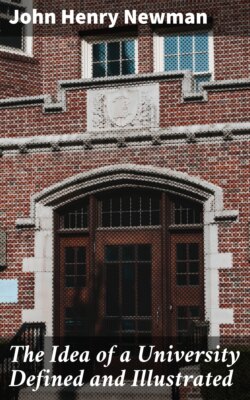Читать книгу The Idea of a University Defined and Illustrated - John Henry Newman - Страница 36
На сайте Литреса книга снята с продажи.
1.
ОглавлениеTable of Contents
Nothing is more common in the world at large than to consider the resistance, made on the part of religious men, especially Catholics, to the separation of Secular Education from Religion, as a plain token that there is some real contrariety between human science and Revelation. To the multitude who draw this inference, it matters not whether the protesting parties avow their belief in this contrariety or not; it is borne in upon the many, as if it were self-evident, that religious men would not thus be jealous and alarmed about Science, did they not feel instinctively, though they may not recognize it, that knowledge is their born enemy, and that its progress, if it is not arrested, will be certain to destroy all that they hold venerable and dear. It looks to the world like a misgiving on our part similar to that which is imputed to our refusal to educate by means of the Bible only; why should you dread the sacred text, men say, if it be not against you? And in like manner, why should you dread secular education, except that it is against you? Why impede the circulation of books which take religious views opposite to your own? Why forbid your children and scholars the free [pg 072] perusal of poems or tales or essays or other light literature which you fear would unsettle their minds? Why oblige them to know these persons and to shun those, if you think that your friends have reason on their side as fully as your opponents? Truth is bold and unsuspicious; want of self-reliance is the mark of falsehood.
Now, as far as this objection relates to any supposed opposition between secular science and divine, which is the subject on which I am at present engaged, I made a sufficient answer to it in my foregoing Discourse. In it I said, that, in order to have possession of truth at all, we must have the whole truth; and no one science, no two sciences, no one family of sciences, nay, not even all secular science, is the whole truth; that revealed truth enters to a very great extent into the province of science, philosophy, and literature, and that to put it on one side, in compliment to secular science, is simply, under colour of a compliment, to do science a great damage. I do not say that every science will be equally affected by the omission; pure mathematics will not suffer at all; chemistry will suffer less than politics, politics than history, ethics, or metaphysics; still, that the various branches of science are intimately connected with each other, and form one whole, which whole is impaired, and to an extent which it is difficult to limit, by any considerable omission of knowledge, of whatever kind, and that revealed knowledge is very far indeed from an inconsiderable department of knowledge, this I consider undeniable. As the written and unwritten word of God make up Revelation as a whole, and the written, taken by itself, is but a part of that whole, so in turn Revelation itself may be viewed as one of the constituent parts of human knowledge, considered as a whole, and [pg 073] its omission is the omission of one of those constituent parts. Revealed Religion furnishes facts to the other sciences, which those sciences, left to themselves, would never reach; and it invalidates apparent facts, which, left to themselves, they would imagine. Thus, in the science of history, the preservation of our race in Noah's ark is an historical fact, which history never would arrive at without Revelation; and, in the province of physiology and moral philosophy, our race's progress and perfectibility is a dream, because Revelation contradicts it, whatever may be plausibly argued in its behalf by scientific inquirers. It is not then that Catholics are afraid of human knowledge, but that they are proud of divine knowledge, and that they think the omission of any kind of knowledge whatever, human or divine, to be, as far as it goes, not knowledge, but ignorance.
